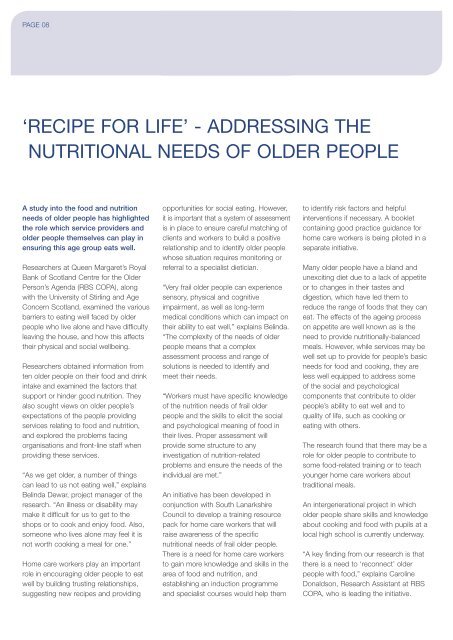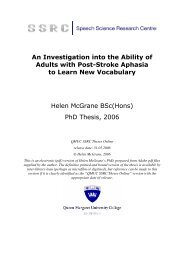QM News 63 (pdf 752KB) - Queen Margaret University
QM News 63 (pdf 752KB) - Queen Margaret University
QM News 63 (pdf 752KB) - Queen Margaret University
Create successful ePaper yourself
Turn your PDF publications into a flip-book with our unique Google optimized e-Paper software.
PAGE 08<br />
‘RECIPE FOR LIFE’ - ADDRESSING THE<br />
NUTRITIONAL NEEDS OF OLDER PEOPLE<br />
A study into the food and nutrition<br />
needs of older people has highlighted<br />
the role which service providers and<br />
older people themselves can play in<br />
ensuring this age group eats well.<br />
Researchers at <strong>Queen</strong> <strong>Margaret</strong>’s Royal<br />
Bank of Scotland Centre for the Older<br />
Person’s Agenda (RBS COPA), along<br />
with the <strong>University</strong> of Stirling and Age<br />
Concern Scotland, examined the various<br />
barriers to eating well faced by older<br />
people who live alone and have difficulty<br />
leaving the house, and how this affects<br />
their physical and social wellbeing.<br />
Researchers obtained information from<br />
ten older people on their food and drink<br />
intake and examined the factors that<br />
support or hinder good nutrition. They<br />
also sought views on older people’s<br />
expectations of the people providing<br />
services relating to food and nutrition,<br />
and explored the problems facing<br />
organisations and front-line staff when<br />
providing these services.<br />
“As we get older, a number of things<br />
can lead to us not eating well,” explains<br />
Belinda Dewar, project manager of the<br />
research. “An illness or disability may<br />
make it difficult for us to get to the<br />
shops or to cook and enjoy food. Also,<br />
someone who lives alone may feel it is<br />
not worth cooking a meal for one.”<br />
Home care workers play an important<br />
role in encouraging older people to eat<br />
well by building trusting relationships,<br />
suggesting new recipes and providing<br />
opportunities for social eating. However,<br />
it is important that a system of assessment<br />
is in place to ensure careful matching of<br />
clients and workers to build a positive<br />
relationship and to identify older people<br />
whose situation requires monitoring or<br />
referral to a specialist dietician.<br />
“Very frail older people can experience<br />
sensory, physical and cognitive<br />
impairment, as well as long-term<br />
medical conditions which can impact on<br />
their ability to eat well,” explains Belinda.<br />
“The complexity of the needs of older<br />
people means that a complex<br />
assessment process and range of<br />
solutions is needed to identify and<br />
meet their needs.<br />
“Workers must have specific knowledge<br />
of the nutrition needs of frail older<br />
people and the skills to elicit the social<br />
and psychological meaning of food in<br />
their lives. Proper assessment will<br />
provide some structure to any<br />
investigation of nutrition-related<br />
problems and ensure the needs of the<br />
individual are met.”<br />
An initiative has been developed in<br />
conjunction with South Lanarkshire<br />
Council to develop a training resource<br />
pack for home care workers that will<br />
raise awareness of the specific<br />
nutritional needs of frail older people.<br />
There is a need for home care workers<br />
to gain more knowledge and skills in the<br />
area of food and nutrition, and<br />
establishing an induction programme<br />
and specialist courses would help them<br />
to identify risk factors and helpful<br />
interventions if necessary. A booklet<br />
containing good practice guidance for<br />
home care workers is being piloted in a<br />
separate initiative.<br />
Many older people have a bland and<br />
unexciting diet due to a lack of appetite<br />
or to changes in their tastes and<br />
digestion, which have led them to<br />
reduce the range of foods that they can<br />
eat. The effects of the ageing process<br />
on appetite are well known as is the<br />
need to provide nutritionally-balanced<br />
meals. However, while services may be<br />
well set up to provide for people’s basic<br />
needs for food and cooking, they are<br />
less well equipped to address some<br />
of the social and psychological<br />
components that contribute to older<br />
people’s ability to eat well and to<br />
quality of life, such as cooking or<br />
eating with others.<br />
The research found that there may be a<br />
role for older people to contribute to<br />
some food-related training or to teach<br />
younger home care workers about<br />
traditional meals.<br />
An intergenerational project in which<br />
older people share skills and knowledge<br />
about cooking and food with pupils at a<br />
local high school is currently underway.<br />
“A key finding from our research is that<br />
there is a need to ‘reconnect’ older<br />
people with food,” explains Caroline<br />
Donaldson, Research Assistant at RBS<br />
COPA, who is leading the initiative.

















